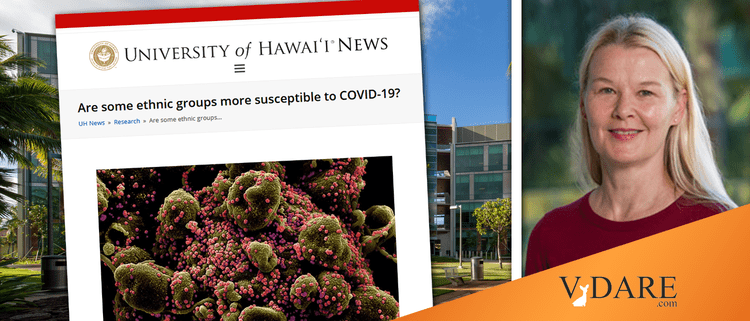


By Steve Sailer
04/03/2020
From the U. of Hawaii:
Are some ethnic groups more susceptible to COVID-19?
UH News » Research » Are some ethnic groups…
April 2, 2020 UH NewsA University of Hawaiʻi Cancer Center molecular epidemiologist is working on an initiated coronavirus study aimed at understanding why certain individuals and racial/ethnic groups are more prone to the infection, and may suffer more severe symptoms of COVID-19.
The study by Maarit Tiirikainen and Hawaiʻi-based genomics company LifeDNA, Inc. will initially focus on the multi-ethnic population of Hawaiʻi and genetic variants of the ACE2 gene as they relate to infection with the severe acute respiratory syndrome coronavirus 2 (SARS-CoV-2), the virus that causes COVID-19.
“There have been major differences in the rates of SARS-CoV-2 infection and the severe disease between the different geographic regions since the beginning of the COVID-19 pandemic, even among young individuals,” said Tiirikainen, an associate professor at UH Mānoa.
“Epidemiological studies.indicate that populations carry different variants of the ACE2 gene. This variation in the gene coding for the ACE2 receptor may have an effect on the number of ACE2 receptors on the lung cells, as well as on how effectively the virus binds to the receptor. There may also be genetic differences in immunity and other important genes explaining why some people get more sick than others,” she added.
Polynesians were particularly hard hit by the Spanish Flu of a century ago, so it’s a good idea to check up on these things.
On the other hand I haven’t been paying much attention to speculation over whether some racial groups are more or less prone to infection and severity of outcome.
I have strong opinions on topics like how human biodiversity affects sprinting results, because there is a huge amount of data on this, and we’ve had decades to argue over it. In contrast, we have three months of data on a brand new disease and we don’t (yet) have any kind of level playing field to distinguish nature from nurture. At this point, things seem pretty random and contingent.
There doesn’t seem to be much in the way of a priori reasons for imagining that any specific group would be more or less vulnerable than any other to a novel disease, other than wishful thinking. (When it comes to diseases, people like to have a theory explaining why those who have gotten it deserve to get it, and why they, personally, won’t get it because they deserve to not get it.)
First there was speculation then Chinese were particularly susceptible so nobody else had much to worry about. Then Iranians had to be accommodated into the theory. Then Northern Italians. Then New Yorkers. Then Detroiters.
On the other hand, there may well turn out to be in hindsight genetic differences in response to this novel virus, which would be both innately interesting and potentially useful. No section of the human race has had time to evolve a resistance to this particular disease yet, but it might turn out that, say, resistance to some other older disease might play a role with the new disease. Or something else.
Time will tell.